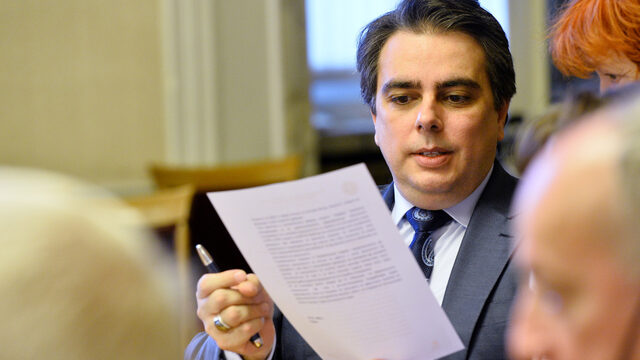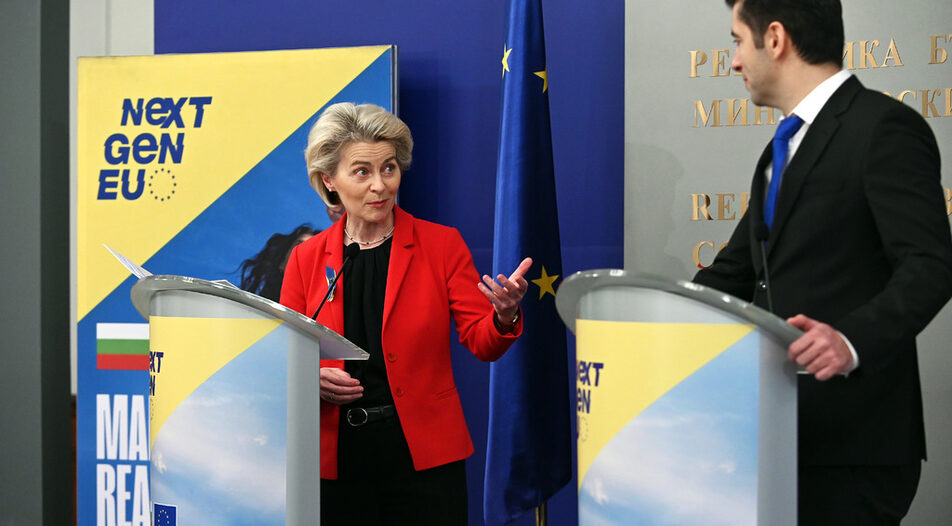"This is an outstanding plan. Almost 60% of it supports the green transition". Those were the words of Ursula von der Leyen, the EU Commission's president, to describe the final version of Bulgaria's Recovery and Resilience Plan. On a visit to Sofia at the start of April she granted the country a long-awaited approval for the 6 billion euros in funding from the EU's stimulus package for Covid recovery.
The road there was rocky. Bulgaria was due to start receiving the funding at the end of 2021. It subsequently transpired that the first version of the plan (drafted by GERB) was full of mistakes. Two caretaker governments tried to render it acceptable to Brussels.
Finally, in order to get approval, Deputy Prime Minister Atanas Pekanov even did what no predecessor had done - he proposed a deadline for closing Bulgaria's coal plants in the Maritsa basin. But this, apparently, was insufficient and Sofia remained one of two countries not to get any advance payments last year.
The new man in charge - Deputy Prime Minister and Minister of Finance Assen Vassilev - and his team submitted the revamped version of the document in mid-March. It quickly became evident that the section concerning the energy transition had gone through the most significant changes.
A 180 with security in mind
In short, the government dropped the 2 bln BGN planned investment into steam and gas capacities for the Maritsa East complex, gave up on setting a deadline for the closing of those coal plants, and redirected most of the funding towards battery production and the development of geothermal capabilities.
According to the plan, batteries with a total capacity of 6,000 MWh will be installed, which will be able to feed 1,000 MWh into the grid for 6 hours. This is equivalent to the operation of one of the Kozloduy Nuclear Power Plant (NPP) units, but with much less loss during the transportation of energy (typically around 8 - 10 percent) as the batteries would be distributed around the country.
This is a cardinal change in approach that turns the current plans for the development of the Bulgarian energy sector on their head. However, there is logic behind it. The gas facilities that could have been built would have increased the country's dependency on gas imports - recent months have shown that natural gas can be extremely expensive and even disappear from the market altogether during times of conflicts. The caretaker cabinet deemed them necessary in order to replace coal and still provide some employment for workers in the Maritsa East complex.
The promise of battery production
The new government believes energy security could be provided through the installation of batteries, which have several advantages - they are very flexible, can be powered by local resources (sun, wind, water) and better maintain the frequency and security of the grid. In addition, while some batteries run out of power, others can be re-charged and vice versa.
This does not eliminate the drawbacks of batteries. They are still quite expensive, they are hard to find in large quantities within a short period, and do not create any jobs. That is why an essential part of the government's plan is to build a factory to produce such batteries, probably in the Stara Zagora region. This will create jobs, offset the economic transition costs and, as global demand for batteries increases in coming years, create export opportunities.
Implementing this project is undoubtedly quite difficult and risky. However, if the government manages to organize a good international tender to attract an investor in the battery plant and it is indeed built within the next two years, Bulgaria could score a great win.
At the moment, the country has declared investment intentions for over 15 thousand MW of new renewable energy capacity, half of which could actually be commissioned by 2026. Combined with giga-batteries for energy storage and planned investments in grid improvement and management, this will provide a large amount of cheap, secure and green energy - conditions that all foreign investors are now setting.
Coal's pros
Do we want to substitute a local resource for an imported one?

This rhetorical question posed by Assen Vassilev in February is almost eerily salient given Gazprom's recent decision to cancel gas deliveries to Bulgaria and Poland. It is also one argument for keeping Bulgaria's coal plants running that the EU Commission could hardly dismiss. Furthermore, the EU's own strategy is to shut down all gas-fired plants by 2035, which limits any benefits that investing into such technology to a short time span.
According to Vassilev the country's 2019 commitment to cut CO2 emissions by 40% would not automatically be pushed back by keeping coal plants running. Achieving this goal is rather a matter of gradually limiting coal energy production, especially during the spring and the summer.
This process will be eased further by the expiry of the operation contracts between the government and American energy companies which operate 2 of the coal plants in the Maritsa basin. In a statement made in February the energy minister Aleksandyr Nikolov emphasized that those investors should be retained by providing them with access to alternative energy sources such as gas or nitrogen.
"The Maritsa East complex and its auxiliary mines remain key for balancing the energy supply in Bulgaria and the region. Decreasing the country's energy production capacity would result in supply issues for neighboring countries, higher prices and even electricity outages," Nikolov said.
A solar-powered plan
Even though the Plan lengthens the phase out of coal, it still prioritizes the transition to green energy and the construction of solar plants in particular. This should come as no surprise, considering that nearly 75% of Bulgaria's carbon footprint is caused by energy production. With coal powered plants accounting for 40% of the energy mix alone, developing renewable energy substitutes is key for offsetting the pollution.
The Plan designates a sum amounting to 878 mln. lev for cofunding solar projects, including auxiliary battery storage. The goal is to increase the country's energy capacity by at least 1.4 GW. The funding is aimed mostly at offsetting battery costs. Energy produced by the solar plants will be traded on prices set by market demand.
Funding will be distributed through 6 auctions, each for at least 285 MG in capacity. 25% of those are designated for smaller power plants with the aim of preventing monopoly. The rest of the capacity could be auctioned off to one or two major producers. A number of such large-scale projects are already in motion. An important requirement for all projects is to build up battery storage significant enough to maintain energy supply for 4 hours.
The projects will be ranked based on who requests the least amount of aid. To guarantee the fairness of the process, the Plan sets a requirement that the funding be distributed by an international financial institution based in Europe, with significant experience in the region.
Despite the emphasis on batteries, the new power plants will create demand for updates in the electrical grid. The Plan will provide 370 mln. lev in funding to the national authority tasked with managing the national grid to meet this demand. The authority would need to provide another 270 mln. lev in funding to complete the project.
The large demand for battery storage solutions as per this part of the Plan generates new opportunities for entrepreneurs in the energy sector. As the green transition takes on an international scope, local storage solutions could be scaled. Possible new products range from balancing software solutions to design and technical advisory, system integration etc. Overall, funding from the Recovery plan has the potential to give Bulgarian businesses a competitive edge in the global race for developing green technologies.
The project also contributes to the achievement of strategic autonomy, as it envisions investment in infrastructure, which will increase the share of renewable energy used. On its own, renewable energy provides even greater autonomy to energy consumers and system security.
Geothermal plan(t)s
Funding provided through the Plan will be used for research into the potential for geothermal energy generation in Bulgaria.
"We consulted with large Turkish companies, which have worked on such projects. Based on the available data gathered in the 80-s, Southern Bulgaria has similar geothermal potential to the areas of Turkey in which they operate. Modern technology could help us uncover further geothermal capacities throughout the country," added the energy minister.
According to preliminary evaluations the required investment per megawatt is 3 million euro. Operational costs would range between 15 and 40 lev/mWh while consumer costs are expected to be from 120 to 150 lev/mWh. So far there are plans for one power and one heating plant.
According to Nikolov, these projects would have several positive effects. "If temperatures are sufficiently high, prices would be low. But, more importantly, geothermal plants would allow us to diversify our energy sources."
When will the first investments come through?
The Plan is currently pending approval by the Council of the EU. This would take another few weeks. Afterwards the Bulgarian government will be able to start funding projects. An important caveat is that the funding would come from the national budget and be reimbursed by the EU later based on results. The government has allocated 2 bln. euro for funding through the plan in 2022. Most of the funding designated for the business sector would likely not reach beneficiaries until the start of next year. The first round of funding for renewable energy projects is one of the few initiatives which could actually go through in the upcoming months."This is an outstanding plan. Almost 60% of it supports the green transition". Those were the words of Ursula von der Leyen, the EU Commission's president, to describe the final version of Bulgaria's Recovery and Resilience Plan. On a visit to Sofia at the start of April she granted the country a long-awaited approval for the 6 billion euros in funding from the EU's stimulus package for Covid recovery.












